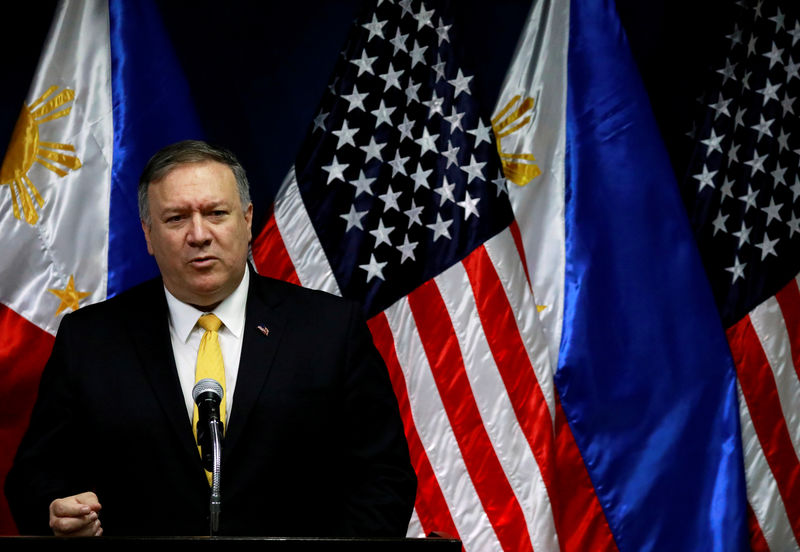By Ron Bousso and Gary McWilliams
HOUSTON (Reuters) - U.S. Secretary Of State Mike Pompeo will meet with top oil executives before he addresses a conference on Tuesday, seeking to get them to help the administration's effort to boost crude exports to Asia and to support its policy of isolating Iran, according to three people at two companies briefed on the agenda.
The outreach represents a significant new effort to sway industry executives to the Trump Administration’s “energy dominance” agenda that seeks to advance diplomatic and policy objectives through rapidly expanding U.S. oil and gas exports. The effort has won success in convincing nations including China, Poland, Japan and South Korea to purchases more U.S. oil and natural gas.
Pompeo plans on discussing how to boost U.S. energy dominance worldwide, but particularly in Asia, and further isolate the Islamic Republic of Iran, which the United States re-imposed sanctions on last year, through strengthening ties with other Middle East nations, the people said. The location and time of the meeting was unclear.
Following the meeting in Houston, Pompeo is set to speak at IHS Markit's CERAWeek conference, the oil and gas industry’s largest annual gathering in the United States. He was scheduled to meet State Department employees in the late morning, according to an official schedule.
Executives from major companies including Chevron Corp (NYSE:CVX), Total SA (PA:TOTF), Royal Dutch Shell (LON:RDSa) PLC, ConocoPhillips (NYSE:COP) and Occidental Petroleum Corp (NYSE:OXY) have been invited to the closed door meeting. Representatives from a number of those companies are scheduled to speak earlier in the day at CERAWeek.
Occidental declined to comment. Chevron had no comment. A Total representative could not immediately be reached for comment. The other companies did not immediately respond to requests for comment.
A U.S. State Department spokesperson did not immediately comment on Pompeo's schedule but did say that Frank Fannon, the department's top energy diplomat, was meeting with energy companies on Tuesday in Houston to talk about the Asia policy.
According to two of the sources, Pompeo was expected in the closed door meeting to discuss the Trump administration's plans for the Middle East Strategic Alliance (MESA), which would form an alliance of Sunni Muslim countries in the Gulf, including Saudi Arabia, Kuwait, the United Arab Emirates, Qatar, Oman, Bahrain, Egypt and Jordan, as the White House seeks to restrain Iran.
That group has become mired in a dispute between Qatar and Saudi Arabia, both important U.S. allies in the region. The lead U.S. negotiator for the alliance, Anthony Zinni, left the position earlier this year, putting a plan to promote Arab security and battle extremism in jeopardy.
Tuesday's sit-down was also expected to include discussions on the United States’ policy in Asia. Dubbed 'Asia Edge' by the administration, it aims to grow Asian energy security by further expanding U.S. oil and gas exports to the region, according to the sources.
“The success of Asia Edge is highly dependent on what private industry does and then the work the government can do to support that,” the spokesperson at the State Department’s energy bureau said.
“The main message is how we can work best with the companies. Consequently engaging with the CEOs, especially on Asia Edge, is key because they're playing a much bigger role than we would have seen in other types of similar issues."
The United States produces more than 12 million barrels per day (bpd) of crude, making it the world's largest producer, and it is the world's biggest exporter of refined products like diesel fuel and gasoline.
It has expanded sales of fuels, crude oil and liquefied natural gas (LNG) to Asian customers, including China in a bid to dominate worldwide energy trade after a four-decade ban on crude exports was ended by President Obama in 2016. The United States now exports more than 3 million bpd of crude.
The Trump White House has also imposed harsh sanctions on Iran and Venezuela, both members of the Organization of the Petroleum Exporting Countries (OPEC), removing more than 2 million bpd of oil from daily global supply.
After the Iran sanctions were imposed, the United States granted waivers to eight countries that buy Iranian oil. The waivers, aimed at avoiding a spike in global crude prices, are due to expire in May. Some are not likely to be renewed, though analysts believe India and China, among the world's largest crude buyers, will continue to receive waivers.

Brian Hook, the State Department's top Iran diplomat, is scheduled to speak at CERAWeek in Houston on Wednesday morning on current U.S. policy on Iran.